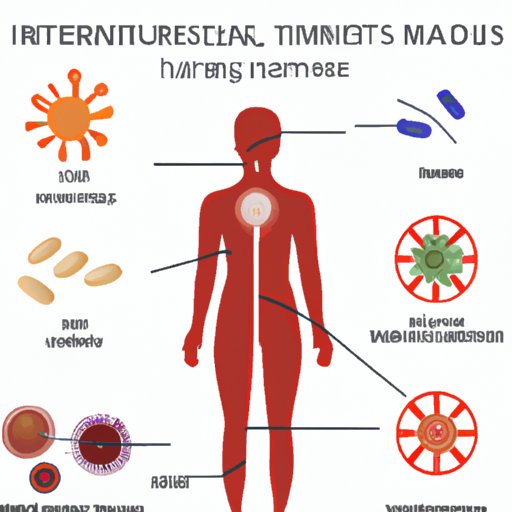
Introduction
Autoimmune diseases are a complex group of conditions that occur when the immune system mistakenly attacks healthy cells in the body. There are more than 80 known autoimmune diseases, and they can affect any part of the body. Diagnosing an autoimmune disease can be a difficult, lengthy process that requires careful consideration of a wide range of symptoms. In this article, we’ll explore how to diagnose autoimmune diseases and provide helpful tips for determining whether or not you or someone you know may be at risk.
List of Symptoms
There are a variety of symptoms that can occur in autoimmune diseases and they can vary depending on the condition. Some common symptoms include:
- Fatigue and weakness
- Fever
- Joint pain and stiffness
- Skin rashes and lesions
- Muscle pain and weakness
- Hair loss
- Difficulty concentrating or remembering
It is important to note that symptoms of autoimmune diseases may be interrelated, meaning that the presence of one symptom can trigger other symptoms. For example, joint pain may lead to muscle weakness and fatigue.
Tests or screenings that can be done to detect symptoms of autoimmune diseases include:
- Complete blood count (CBC)
- C-reactive protein (CRP)
- Antinuclear antibodies (ANA)
- Rheumatoid factor (RF)
- Erythrocyte sedimentation rate (ESR)
- Thyroid-stimulating hormone (TSH)
Understanding the Immune System
The immune system is responsible for protecting the body from infections and foreign substances. When it detects a threat, it sends specialized cells to attack and destroy the invader. In autoimmune diseases, the immune system mistakenly attacks the body’s own cells and tissues.
Autoimmune diseases occur when something goes wrong with the normal functioning of the immune system. This can include an attack on healthy cells or the production of autoantibodies – antibodies that mistakenly target the body’s own proteins. These attacks can lead to a range of symptoms and medical conditions, depending on which organs or tissues are affected.
Identifying Triggers
Autoimmune diseases have a complex set of triggers that can cause them to develop. These triggers can include genetics, environmental factors, and lifestyle habits. Some of the key risk factors for autoimmune diseases include:
- Gender (women are more likely than men to develop autoimmune diseases)
- Age (many autoimmune diseases tend to develop in middle age)
- Genetics (certain genes can increase the risk of autoimmune disease)
- Environmental factors (exposure to certain toxins or infections can trigger autoimmune diseases)
- Lifestyle habits (poor diet, lack of sleep, etc.)
If you suspect that you may be at risk for an autoimmune disease, it’s important to assess your own risk and take steps to protect your health. This may include making lifestyle changes to improve your overall health or seeking medical attention if you are experiencing symptoms of autoimmune disease.
Diagnostics Checklist
To determine whether you should consider getting tested for autoimmune disease, ask yourself the following questions:
- Have I experienced any of the common symptoms of autoimmune disease?
- Do I have a family history of autoimmune disease?
- Do I have other medical conditions that may increase my risk of autoimmune disease?
- Am I exposed to environmental factors that may trigger autoimmune disease?
- Do I have any lifestyle habits that may be contributing to my risk of autoimmune disease?
Diagnostic Testing Options
There are several different types of diagnostic testing options that can be used to identify autoimmune diseases. Some of the most common tests include:
- Blood and urine tests: These tests can detect the presence of autoantibodies or other markers of autoimmune disease.
- Imaging tests: These tests can help visualize the affected organs or tissues.
- Biopsies: These tests involve taking a small sample of tissue for examination under a microscope.
- Other tests: Depending on the specific autoimmune disease, other tests may be necessary to make a proper diagnosis.
Conclusion
Autoimmune diseases are complex conditions that require careful diagnosis to identify and treat properly. If you suspect that you may be at risk for an autoimmune disease or are experiencing symptoms, seek medical attention right away. With a careful diagnostic process and proper medical care, it is possible to manage the symptoms of autoimmune disease and live a healthy, fulfilling life.




